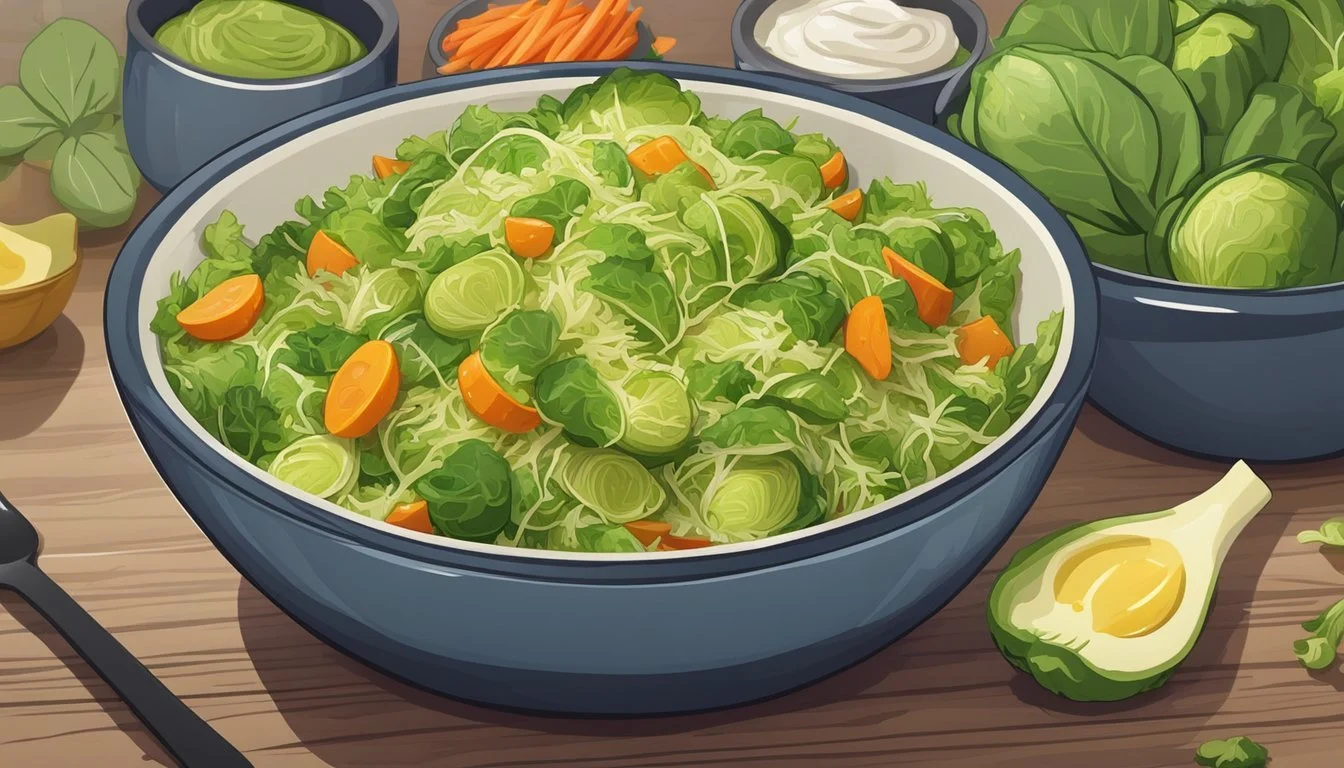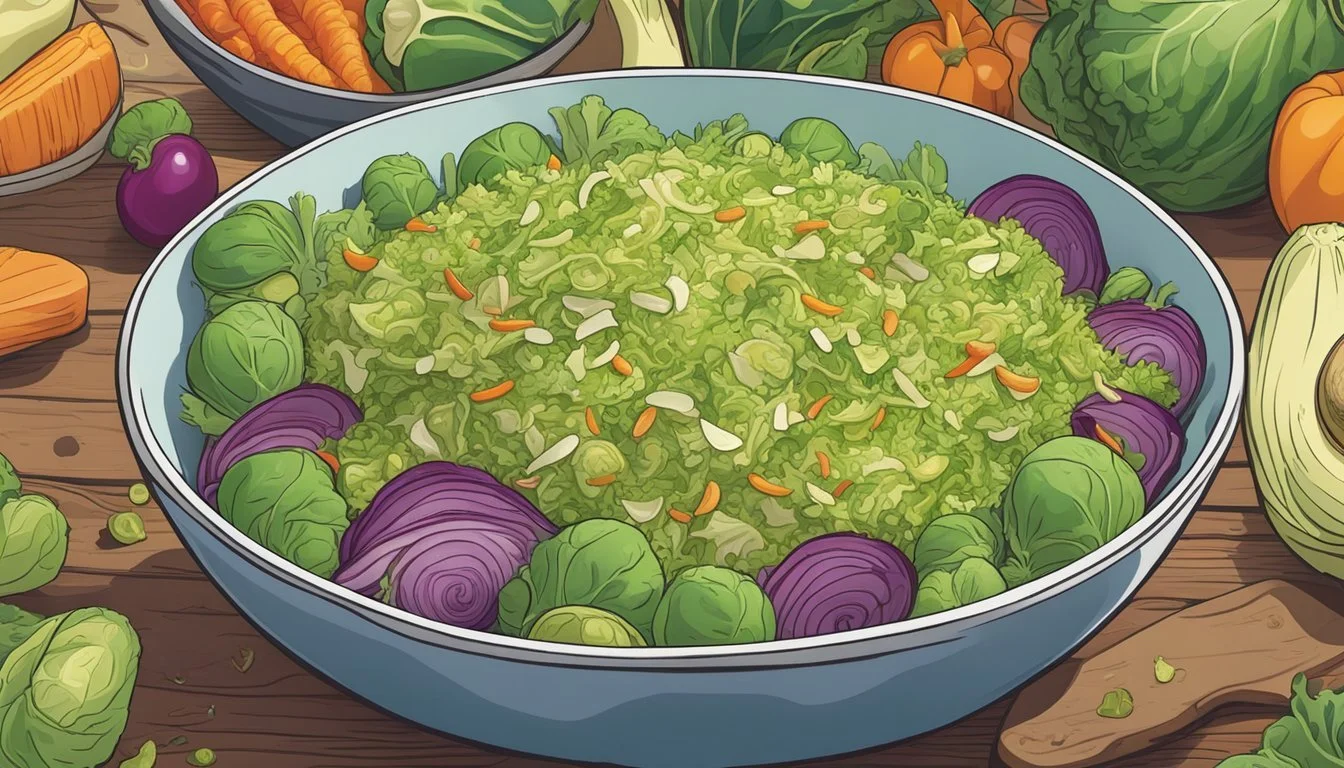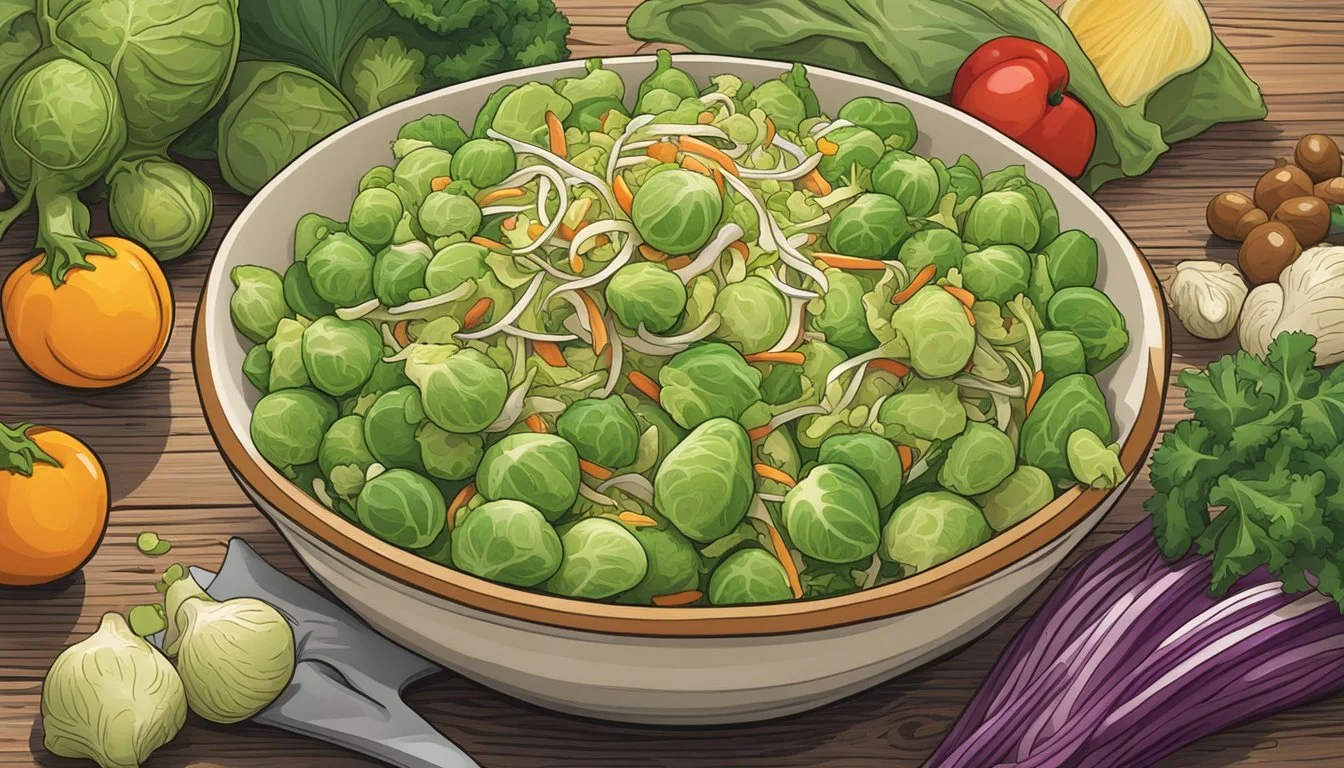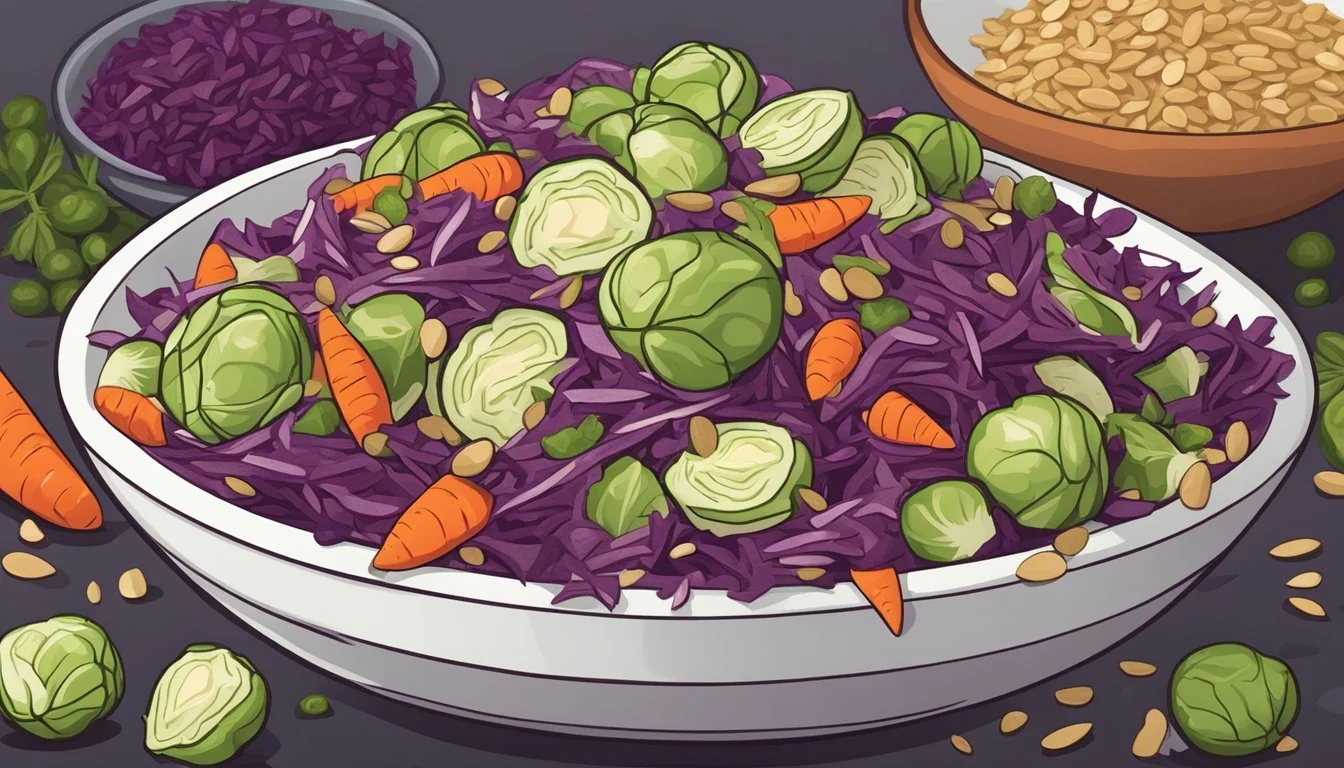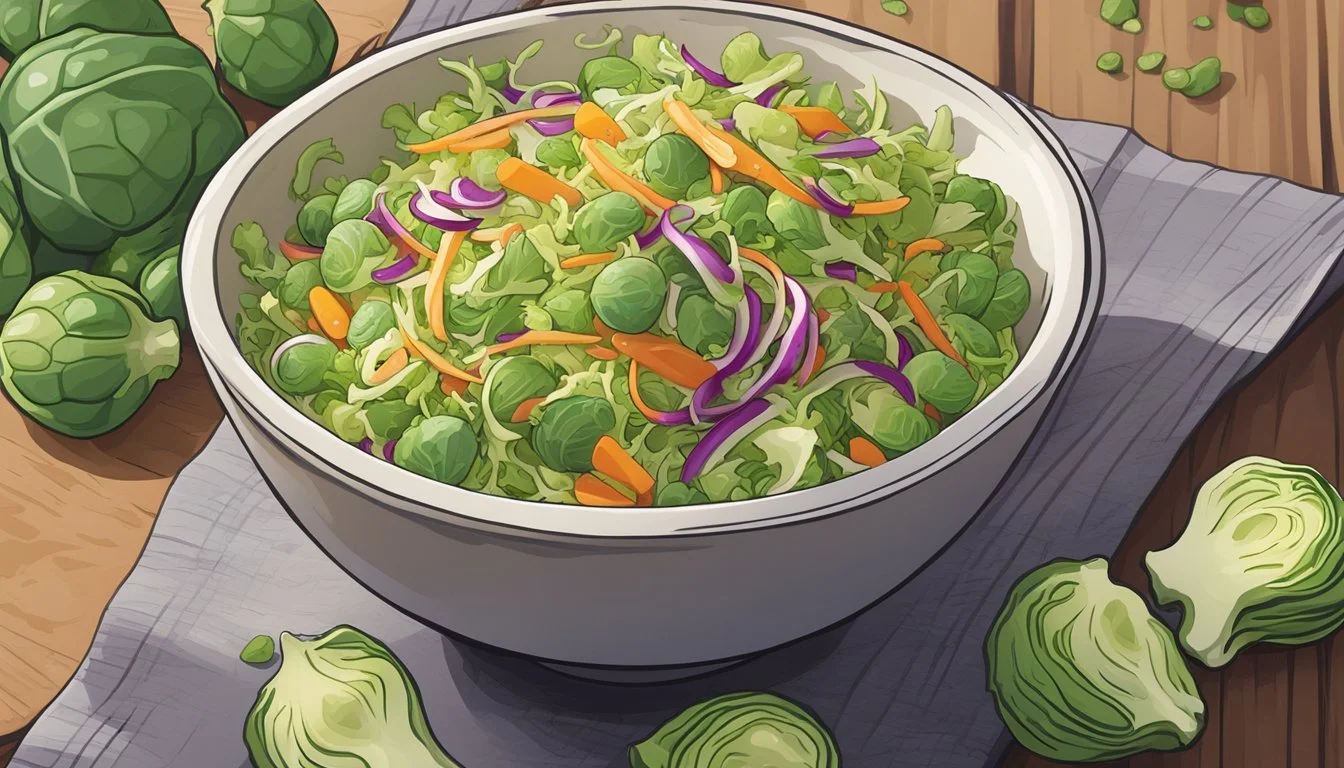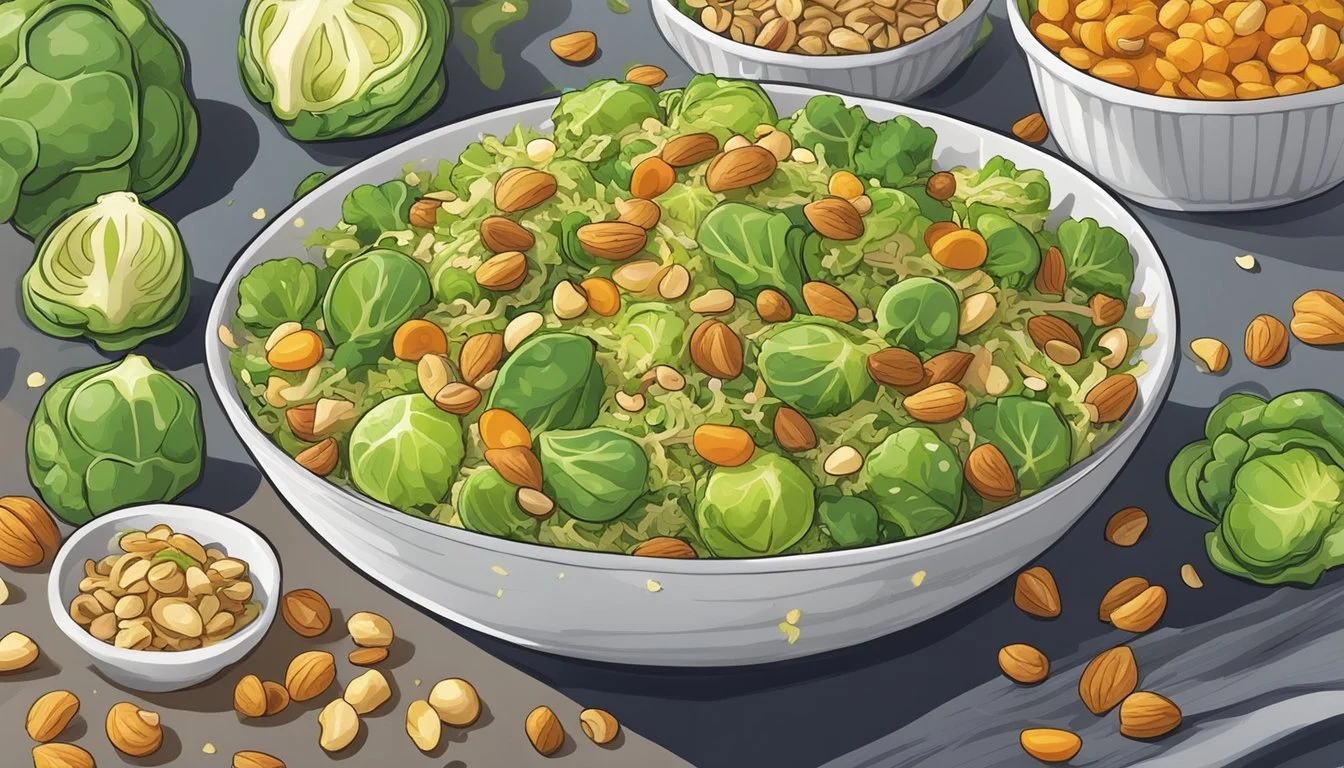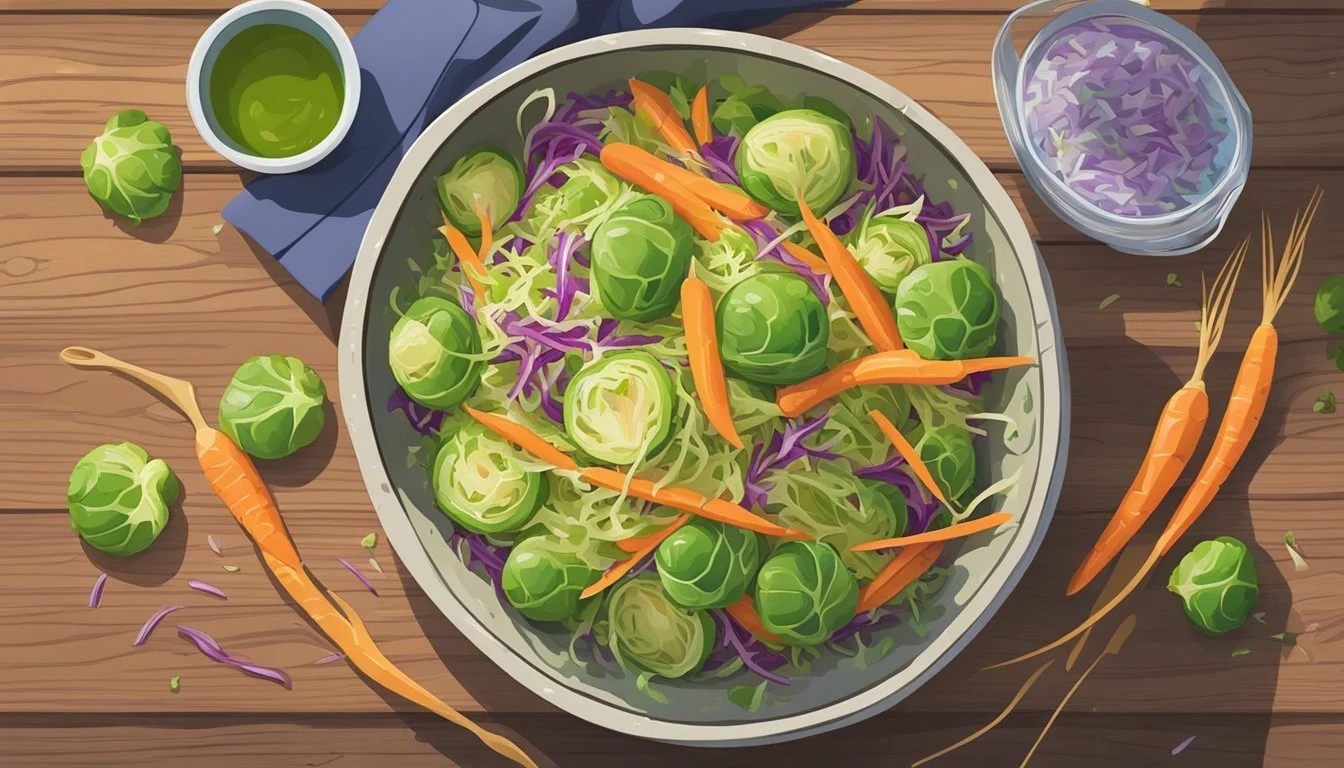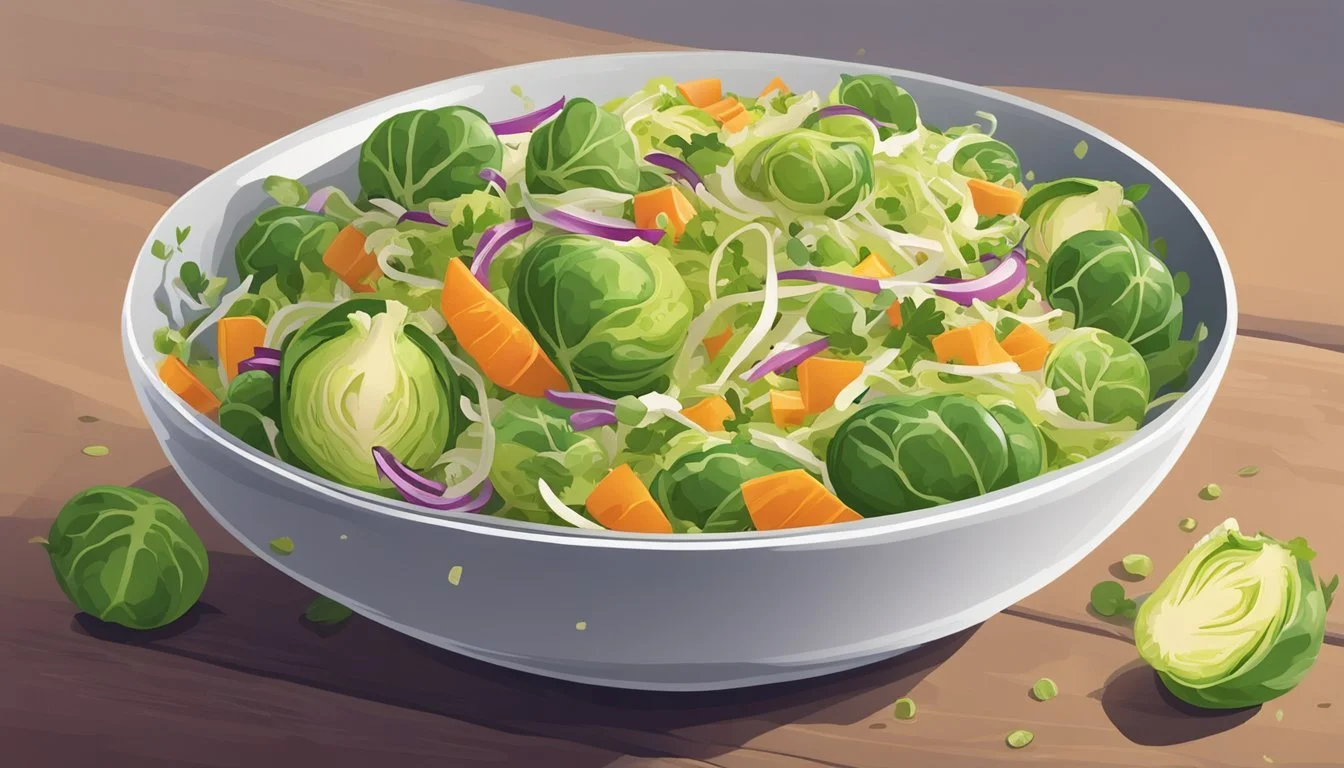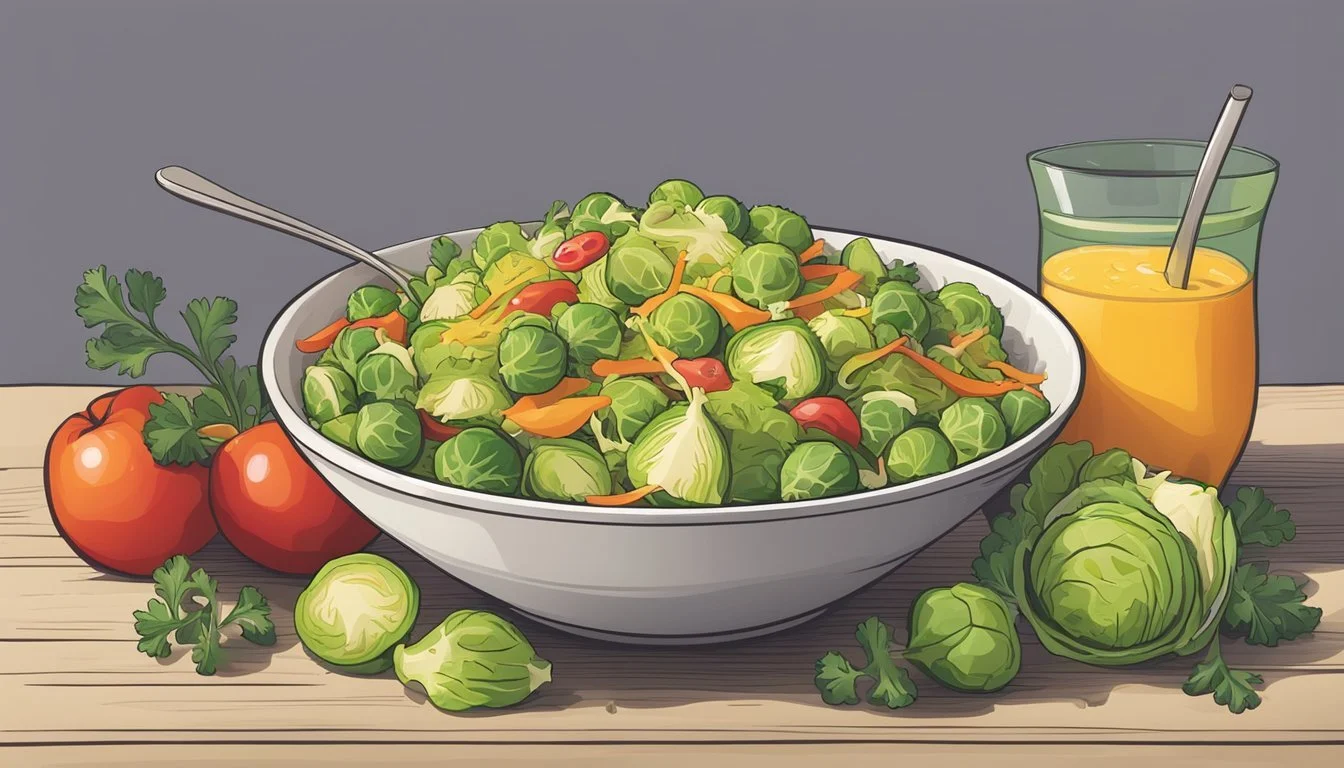Brussels Sprout Core Slaw
Discover the Nutritional Benefits of This Crunchy Side Dish
Brussels sprout slaw is emerging as a popular twist on traditional coleslaw, combining the distinct flavors and nutritional benefits of Brussels sprouts with the crisp texture expected of a well-made slaw. Unlike their cousin, the cabbage, Brussels sprouts bring a certain nutty depth to the dish which pairs beautifully with a variety of dressings, from tangy Dijon to creamy mayonnaise-based options.
As a side dish, Brussels sprout slaw is more than just a crunchy, satisfying accompaniment. Its high vitamin content, particularly Vitamins C and K, and the presence of antioxidants make it a healthy eating choice. The versatility of Brussels sprout slaw means it can complement a wide range of main courses, from barbecued meats (What wine goes well with barbecued meats?) to vegetarian entrees.
Their preparation is straightforward—the sprouts are typically shredded into fine strips, which are then tossed with a dressing and a combination of add-ins such as nuts, dried fruit, or cheeses. This approach allows the Brussels sprout's robust texture and flavor to stand out, while the dressing and mix-ins can be adjusted to suit different tastes and dietary requirements, emphasizing the adaptable nature of this side dish.
Background on Brussels Sprouts
Brussels sprouts, belonging to the Brassica family, are compact, leafy green vegetables known for their unique appearance and nutrient-rich profile. They resemble mini cabbages and are typically harvested from the plant's lower stalks.
These vegetables are a powerhouse of nutrients. They are especially rich in Vitamin C and Vitamin K, which are essential for immune system function and bone health, respectively. Here is a brief overview of the nutritional value provided by Brussels sprouts:
Vitamin C: Acts as an antioxidant and is vital for skin health and immune function.
Vitamin K: Crucial for blood clotting and bone metabolism.
Fiber: Promotes digestive health and can aid in cholesterol management.
Antioxidants: Compounds such as kaempferol found in Brussels sprouts offer protective benefits against oxidative stress.
Nutrient Benefit Vitamin C Immune support, skin health Vitamin K Bone health, blood clotting Fiber Digestive health, cholesterol management Antioxidants Oxidative stress reduction
Studies have identified Brussels sprouts as a vegetable that can support the body's detoxification process, thanks to the presence of sulfur-containing compounds called glucosinolates.
Moreover, their versatility in the kitchen makes them a favorite ingredient in a variety of dishes. From roasted side dishes to being finely shredded for a crisp, flavorful slaw, Brussels sprouts add both nutritional value and a burst of texture to meals.
Health Benefits of Brussels Sprout Core Slaw
Brussels sprout core slaw offers a symphony of health benefits, from an abundance of vitamins and minerals to aiding in digestive health and disease prevention. This crunchy side dish is not only flavorful but also packs a nutritional punch that can contribute to maintaining overall well-being.
Rich in Vitamins and Minerals
Brussels sprouts, the star ingredient in Brussels sprout core slaw, are an excellent source of essential vitamins and minerals. Predominantly, they provide substantial amounts of Vitamin K, which is crucial for blood clotting and bone health. Additionally, they are a good source of Vitamin C, an antioxidant important for immune function and skin health. Minerals such as Folate, Magnesium, and Calcium also contribute to the nutritional profile, supporting metabolic processes and overall health.
Vitamin A
Vitamin C
Folate
Magnesium
Calcium
Fiber Content and Digestive Health
The high fiber content in Brussels sprouts is integral for maintaining digestive health. A serving of Brussels sprout core slaw can aid in supporting a healthy digestive system, contributing to regular bowel movements and aiding in the prevention of constipation. The fiber also has the potential benefit of helping to regulate blood sugar levels, which is important for overall health and metabolism.
Fiber: Assists in digestion and regularity
Potential in Disease Prevention
Brussels sprout core slaw is rich in antioxidants, which have been linked to a reduced risk of chronic diseases, including certain forms of cancer and heart disease. The antioxidants help combat oxidative stress and may reduce inflammation, contributing to heart health. Regular consumption of antioxidant-rich foods like Brussels sprouts can be a heart-healthy choice and may have a role in preventing the onset of disease.
Antioxidants: Combat oxidative stress
Benefits for: Heart Health, Cancer Prevention
Bone Health and Vitamin K
A significant benefit of Brussels sprouts is their Vitamin K content. One serving can deliver more than the daily requirement for this vitamin, which is vital for bone formation and health. This nutrient works in conjunction with Calcium to strengthen the bones and may help reduce the risk of fractures and osteoporosis.
Vitamin K: Essential for bone health
Works with Calcium: Strengthens bones
Preparing Brussels Sprout Core for Slaw
When creating a slaw from Brussels sprouts, one must first focus on the preparation of the vegetable's cores. These cruciferous orbs, although small, are densely packed - both with flavor and nutrients. They make an excellent base for a healthy, crunchy, and vitamin-rich side dish.
Initial Preparation: To commence, one should rinse the Brussels sprouts thoroughly under cool running water to remove any dirt or debris. Peeling away and discarding the outer leaves ensures only the freshest parts are used.
Trimming: After cleaning, the bottom end of each sprout must be trimmed - a place where bitterness concentrates. This also ensures a uniform texture in the final dish.
Shredding: The sprouts are then shredded finely, a critical step for the characteristic crunch of the slaw. One might use a:
Food processor
Mandolin
Sharp knife
A food processor brings efficiency to the task, swiftly creating even shreds. For those preferring manual methods, a mandolin offers precision, while a sharp knife will suffice when equipped with skill and patience.
Final Preparation: Once shredded, it is imperative to fluff them so they can mix well with other ingredients, forming a cohesive and flavorful slaw.
Note on Food Safety: All utensils and cutting surfaces should be clean to prevent cross-contamination. This not only applies to slaw but to all food preparation.
By following these steps, chefs and home cooks alike can transform the robust Brussels sprout into a delightful slaw base, ready to be enhanced with a dressings and mix-ins to suit any palate.
Essential Ingredients for Core Slaw
Crafting the perfect Brussels Sprout Core Slaw hinges on a harmonious blend of crisp vegetables, textural additions that bring crunch and flavor, and dressings that tie it all together with a zestful kick.
Choosing the Right Vegetables
The foundation of any slaw is its vegetables; opt for fresh Brussels sprouts as the star, accompanied by kale, cabbage, collard greens, or other leafy greens to enhance the nutrient profile and texture diversity. One should finely shred these vegetables to ensure an even distribution of flavors and a pleasing mouthfeel. For additional color and sweetness, incorporate julienned carrots or thin slices of apples.
Adding Crunch and Flavor
To elevate the slaw's crunch and flavor, mix in a variety of nuts like pecans or almonds. Seeds such as pumpkin or sunflower also contribute to the desired crunch and introduce a multitude of nutrients. The inclusion of bold ingredients such as red onion or dried fruits like cranberries can add complementary flavors and textural contrast.
The Role of Dressings
A dressing unifies the slaw's components. Options include an emulsion of olive oil and vinegar, which provides a tangy zest, or a creamy base made with yogurt for a smoother texture. Adjust the dressing with seasonings like Dijon mustard, garlic, maple syrup, or celery seeds according to taste preference. The dressing not only adds flavor but also helps tenderize the vegetables, enhancing the slaw's overall taste and texture.
Nutritional Profile of Brussels Sprout Slaw
Brussels sprout slaw is a dish packed with nutrients that can serve as a low-calorie, high-fiber side dish. Each component contributes to its healthy profile.
Calories: Brussels sprouts are low in calories. A 100-gram serving contains about 43 calories, which makes this slaw an excellent choice for those monitoring their calorie intake.
Fat: It generally contains minimal fat unless dressing with high-fat content is used. Using ingredients like olive oil or yogurt-based dressings can keep the fat content healthy and unsaturated.
Carbohydrates: As for carbohydrates, Brussels sprouts contain about 9 grams per 100 grams, mainly from fiber, which aids in digestion. The slaw may contain additional carbohydrates depending on added ingredients like carrots or apples.
Protein: Brussels sprouts are also a good source of plant protein; the same serving size offers about 3 grams of protein.
Fiber: With about 4 grams of dietary fiber per serving, the slaw is hearty and can help in maintaining good digestive health.
Vitamins and Minerals: Besides macronutrients, Brussels sprout slaw is rich in vitamin K, vitamin C, and folate. Toppings like almonds add a healthy dose of vitamin E and minerals such as calcium.
When considering the overall nutritional content of Brussels sprout slaw, remember that preparation methods and additional ingredients will alter these figures. Dressings, in particular, can contribute additional calories, fats, and sometimes sugars.
Below is a brief nutritional summary for a basic Brussels sprout slaw (100g serving):
Nutrient Amount Calories ~43 kcal Fat <1g Carbohydrates ~9g Protein ~3g Fiber ~4g Vitamin K High Vitamin C High Folate Good
This profile emphasizes that Brussels sprout slaw can be a nutritious addition to any meal, offering a variety of essential nutrients while remaining light and digestible.
Creative Variations and Pairings
Brussels sprout slaw is versatile, lending itself well to a range of flavor combinations and pairings. By introducing different proteins, dairy options, fruits, and spices, one can transform the traditional slaw into a dish with a unique and satisfying twist.
Meat and Vegan Protein Options
Incorporating proteins into Brussels sprout slaw can create a more robust dish. Grilled chicken is a classic choice that lends a smoky flavor, while tofu or edamame provide hearty vegan alternatives. These proteins pair well with the slaw’s crunchy texture and can be seasoned to complement the dish’s dressing.
Cheese and Dairy Pairings
Cheese adds a creamy dimension to the slaw's crunch. Shaved Parmesan offers a nutty, salty zest, while crumbled feta contributes a tangy bite. For a vegan twist, nutritional yeast or vegan cheese alternatives can be sprinkled on top. A dash of milk or vegan substitutes in the dressing can mellow sharper flavors.
Incorporating Fruits and Berries
Adding fruits can introduce a sweet contrast to the slaw’s savory notes. Diced apples provide a crisp component, while cranberries or raisins add bursts of tanginess. Berries like blackberries or blueberries can introduce a refreshing and colorful pop to the slaw.
Utilizing Herbs and Spices
Herbs and spices are essential for tailoring the slaw’s profile. Crushed black pepper brings a subtle heat, while garlic adds depth. Fresh parsley can brighten the dish, offering a clean, herby essence that binds the flavors together. Experiment with different combinations to find a personalized blend.
Serving and Presentation Tips
When serving Brussels sprout slaw, attention to both the presentation and the table arrangement can significantly enhance the dining experience. The right serveware and thoughtful plating bring out the visual appeal of this crunchy, vitamin-rich side dish.
Plating Suggestions
For individual servings, one could use white or lightly colored plates to create a visual contrast that accentuates the vibrant greens and added ingredients of the Brussels sprout slaw. Chefs recommend layering the slaw to build height, making it the focal point on the plate. One can garnish with orange slices or a sprinkling of nuts or seeds, thus ensuring that both texture and color are balanced on the plate.
Appropriate Serveware
Choosing the appropriate serveware is key to both functionality and aesthetic. Serving Brussels sprout slaw in a large, shallow bowl allows for easy mixing and access with serving utensils. For an elegant touch, one can opt for glass or ceramic bowls which also showcase the dish’s texture and freshness. Stainless steel or wooden serving spoons or tongs are recommended for ease of serving while maintaining a clean presentation.
Storage and Leftover Ideas
When it comes to Brussels Sprout Coleslaw, proper storage is essential for maintaining both freshness and safety. The ideal way to store this dish is by refrigerating it within two hours of preparation—a critical step to prevent foodborne illnesses.
Refrigeration:
Place the coleslaw in an airtight container.
Refrigerate at or below 40°F (4°C).
Consume within 3–4 days for best quality.
Meal Prep:
For convenience, prepare the slaw in advance and store it in separate, portion-sized containers.
Dressing may be stored separately to keep the slaw crisp and to add just before serving.
Leftovers:
Re-purpose leftover coleslaw as a crunchy addition to sandwiches or tacos.
Mix with quinoa or pasta for a nutritious salad.
Leftover slaw can be sautéed for a warm side dish.
To maintain the slaw's quality, one should not freeze it due to the high water content of the fresh vegetables which would result in a mushy texture upon thawing. Always inspect leftovers for any signs of spoilage before consuming.
Navigating Dietary Restrictions
When creating Brussels Sprout Slaw, one can accommodate various dietary needs by making specific substitutions or omissions. The slaw's inherent flexibility allows for adjustments that cater to gluten-free and allergy considerations, as well as low-carb and keto-friendly diets, ensuring everyone can enjoy this nutritious side dish.
Gluten-Free and Allergy Considerations
For individuals with gluten sensitivities or allergies, the Brussels Sprout Slaw is naturally gluten-free, as the main ingredients—Brussels sprouts, olive oil, and seasonings—do not contain gluten. However, it is crucial to verify that any additional ingredients or dressings are gluten-free. For a completely allergy-friendly slaw, consider the following:
Use homemade or certified gluten-free dressings to avoid cross-contamination.
Substitute nuts with seeds, like pumpkin or sunflower, for those with nut allergies.
Select dairy-free cheese alternatives for vegan or dairy-allergic individuals, ensuring the replacement also satisfies gluten-free requirements if necessary.
Low-Carb and Keto-Friendly Adaptations
Low-carb and ketogenic diet followers can easily integrate Brussels Sprout Slaw into their meal plans. The dish's base is already low in carbohydrates; however, here are some tips to keep it keto-compliant:
Sweeteners: Replace honey or sugar in dressings with keto-approved sweeteners like stevia or erythritol.
Toppings: For added fats, incorporate keto-friendly nuts such as macadamias or pecans, and use high-fat cheeses like Parmesan.
Dressing: Make dressings with high-fat content by including ingredients like avocado oil or full-fat mayonnaise.
By following these specific adjustments, Brussels Sprout Slaw can be tailored to fit within various dietary frameworks, enabling everyone to enjoy its crunchy goodness without compromising their dietary restrictions.
Conclusion
Brussels sprout slaw emerges as a refreshing, healthful side dish that can add both texture and nutrients to one's diet. As a dish high in vitamins C and K, fiber, and antioxidants, it aligns well with a healthy lifestyle and can play a valuable role in diversified meal planning.
This slaw can be customized to include various dressings and additional ingredients such as nuts, seeds, or dried fruit, which not only introduce new flavors but also contribute additional essential nutrients. It's a versatile recipe that one can adapt to fit dietary preferences — from vegetarian to gluten-free diets.
Chefs and home cooks are encouraged to incorporate Brussels sprout slaw into their menu rotation. Its simplicity allows for a quick preparation, making it a practical choice for busy weeknights or a novel dish for social gatherings. Its robust composition also keeps well, offering an excellent option for meal prep enthusiasts.
They may experiment with different ingredients to create a unique slaw that complements their main courses or stands out on a buffet table. The dish's ability to keep well in the fridge for several days makes it a practical option for those planning their meals ahead of time.

